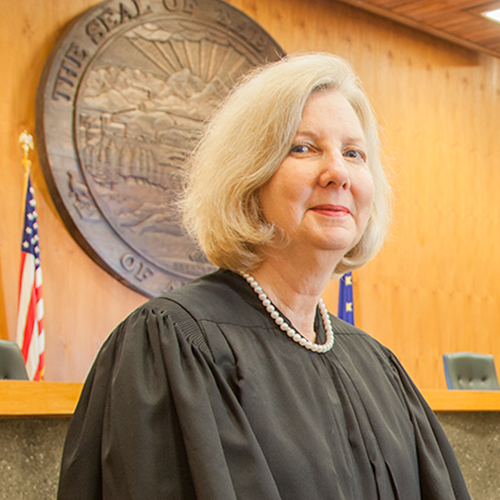
Dana Fabe ’76
Chief Justice, Alaska Supreme Court, Anchorage (retired)
Read My Story
Although it is generally best to contact your lenders directly to discuss specifics of your loan repayment, please feel free to contact our Office of Financial Aid and we will try to assist you. All graduates in qualifying public interest jobs are encouraged to apply to our Loan Deferral and Forgiveness Program and to explore the College Cost Reduction and Access Act (information below).
Here is a list of the most common loan programs that students may have utilized during their attendance at NUSL.
Direct Unsubsidized Loans (formerly known as Federal Stafford) and Federal Graduate PLUS Loans
Direct Loan Servicing Center
Borrower Services Department
P.O. Box 5609
Greenville, TX 75403-5609
1-800-848-0979
Perkins Loans
Heartland ECSI
P.O. Box 1289
Moon Township, PA 15108
888.549.3274
cservice@ecsi.net
Law Access (Private Law Access Loans)
AccessGroup Loan Servicing Center
P.O. Box 9001778
Louisville, KY 40290-1778
1-888-250-6401
MEFA (Private MEFA Loans)
Key Education Resources
745 Atlantic Avenue
Suite 300
Boston, MA 02111
1-800-266-0243
Law Loans (Private Sallie Mae Loans)
Law Loans/SallieMae
PO Box 59012
Panama City, FL 32412-9012
1-800-872-7834
FinAid.org has calculators to assist you in determining your estimated monthly payments on your Federal Loans. If you experience difficulties at any time during your repayment, you should contact your lender immediately to see if a deferment, forbearance, or consolidation program is available. Often these options can assist borrowers with their situation and help students without risking any damage to their credit history.
A deferment is a period during which payments of principal are postponed. No interest accrues on either Direct Subsidized or Perkins loans. Interest is charged on Direct Unsubsidized loans and may be paid or allowed to accrue and capitalize. Borrowers must meet specific eligibility criteria and request the deferment from their lender(s).
During a period of forbearance, borrowers may either suspend payments or reduce their scheduled monthly payment amount on a temporary basis. The lender grants forbearance for a period of up to one year for borrowers who are willing but unable to make their monthly payments. The forbearance is renewable upon the borrower's request and the lender's approval. Interest continues to accrue on the subsidized and unsubsidized loans. The accrued interest may be paid or will be capitalized after the forbearance ends.
Consolidation allows a student with multiple federal loans (either held by multiple lenders or by one lender) to create a new loan and to make one monthly payment for all their federal loans. Consolidation is not the same as receiving a single bill for multiple loans with the same lender. Most lenders will send a borrower one bill or coupon booklet for all the loans that the lender holds for that borrower. Usually, borrowers may submit one payment to the same lender for multiple loans without consolidating.
As of July 1, 2006, borrowers can no longer consolidate while in school and must wait until graduation or leave from their program of study.
Please be aware that if you consolidate any Perkins loans with Direct Loans, you will may lose certain benefits. As always, it is important that you read all information carefully, and that you compare what benefits exist between the original loans versus the consolidation loan.
You cannot consolidate private loans with federal loans. Some private companies may allow you to consolidate private loans and may be able to offer one billing for all loans which they service to you, but that is not the same as Federal Loan Consolidation.
Visit the Federal Direct Lending Loan Consolidation website for more information.
The federal College Cost Reduction and Access Act (CCRAA), signed into law in September 2007, allows many law school graduates to make lower monthly payments on federal loans, with those who go into public service legal careers eligible for full federal loan forgiveness after making payments for 10 years.
Every year, more than 25 percent of Northeastern University School of Law’s graduating class accepts employment in the public sector. Committed to supporting graduates pursuing careers in public interest law, Northeastern University School of Law played a significant role in helping to organize support from law schools and politicians for this legislation.
CCRAA places an annual ceiling on loan payments for borrowers with high educational loan obligations compared to their incomes, thereby enabling new lawyers to make more affordable monthly payments. It also guarantees that after 10 years in public service, the federal government will forgive the remaining obligation on the consolidated federal debt. The Act defines public service jobs quite broadly to include lawyers in both government and “public interest law services (including prosecution or public defense or legal advocacy in low-income communities at a nonprofit organization).” Only federal loans are eligible.
The law school also offers the Loan Deferral and Forgiveness Program to all of its graduates in public interest careers.
For more information on the CCRAA, go to:
The SmartStudent Guide to Financial Aid